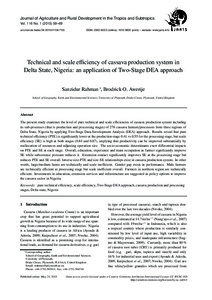Aufsatz

Technical and scale efficiency of cassava production system in Delta State, Nigeria: an application of Two-Stage DEA approach
Zusammenfassung
The present study examines the level of pure technical and scale efficiencies of cassava production system including its sub-processes (that is production and processing stages) of 278 cassava farmers/processors from three regions of Delta State, Nigeria by applying Two-Stage Data Envelopment Analysis (DEA) approach. Results reveal that pure technical efficiency (PTE) is significantly lower at the production stage 0.41 vs 0.55 for the processing stage, but scale efficiency (SE) is high at both stages (0.84 and 0.87), implying that productivity can be improved substantially by reallocation of resources and adjusting operation size. The socio-economic determinants exert differential impacts on PTE and SE at each stage. Overall, education, experience and main occupation as farmer significantly improve SE while subsistence pressure reduces it. Extension contact significantly improves SE at the processing stage but reduces PTE and SE overall. Inverse size-PTE and size-SE relationships exist in cassava production system. In other words, large/medium farms are technically and scale inefficient. Gender gap exists in performance. Male farmers are technically efficient at processing stage but scale inefficient overall. Farmers in northern region are technically efficient. Investments in education, extension services and infrastructure are suggested as policy options to improve the cassava sector in Nigeria.
Zitierform
In: Journal of Agriculture and Rural Development in the Tropics and Subtropics. Kassel : Kassel University Press. - Vol. 116, No. 1 (2015), S. 59-69Sammlung(en)
Vol 116, No 1 (2015) (Journal of Agriculture and Rural Development in the Tropics and Subtropics (JARTS))Zitieren
@article{urn:nbn:de:hebis:34-2015011347155,
author={Rahman, Sanzidur and Awerije, Brodrick Ohiyancho},
title={Technical and scale efficiency of cassava production system in Delta State, Nigeria: an application of Two-Stage DEA approach},
year={2015}
}
0500 Oax 0501 Text $btxt$2rdacontent 0502 Computermedien $bc$2rdacarrier 1100 2015$n2015 1500 1/eng 2050 ##0##urn:nbn:de:hebis:34-2015011347155 3000 Rahman, Sanzidur 3010 Awerije, Brodrick Ohiyancho 4000 Technical and scale efficiency of cassava production system in Delta State, Nigeria: an application of Two-Stage DEA approach / Rahman, Sanzidur 4030 4060 Online-Ressource 4085 ##0##=u http://nbn-resolving.de/urn:nbn:de:hebis:34-2015011347155=x R 4204 \$dAufsatz 4170 7136 ##0##urn:nbn:de:hebis:34-2015011347155
<resource xsi:schemaLocation="http://datacite.org/schema/kernel-2.2 http://schema.datacite.org/meta/kernel-2.2/metadata.xsd"> 2015-06-10T12:19:48Z 2015-06-10T12:19:48Z 2015-05-21 1612-9830 2363-6033 urn:nbn:de:hebis:34-2015011347155 http://hdl.handle.net/123456789/2015011347155 eng Kassel University Press Urheberrechtlich geschützt https://rightsstatements.org/page/InC/1.0/ pure technical efficiency scale efficiency Two-Stage DEA approach cassava production and processing stages Delta state Nigeria 630 Technical and scale efficiency of cassava production system in Delta State, Nigeria: an application of Two-Stage DEA approach Aufsatz The present study examines the level of pure technical and scale efficiencies of cassava production system including its sub-processes (that is production and processing stages) of 278 cassava farmers/processors from three regions of Delta State, Nigeria by applying Two-Stage Data Envelopment Analysis (DEA) approach. Results reveal that pure technical efficiency (PTE) is significantly lower at the production stage 0.41 vs 0.55 for the processing stage, but scale efficiency (SE) is high at both stages (0.84 and 0.87), implying that productivity can be improved substantially by reallocation of resources and adjusting operation size. The socio-economic determinants exert differential impacts on PTE and SE at each stage. Overall, education, experience and main occupation as farmer significantly improve SE while subsistence pressure reduces it. Extension contact significantly improves SE at the processing stage but reduces PTE and SE overall. Inverse size-PTE and size-SE relationships exist in cassava production system. In other words, large/medium farms are technically and scale inefficient. Gender gap exists in performance. Male farmers are technically efficient at processing stage but scale inefficient overall. Farmers in northern region are technically efficient. Investments in education, extension services and infrastructure are suggested as policy options to improve the cassava sector in Nigeria. open access In: Journal of Agriculture and Rural Development in the Tropics and Subtropics. Kassel : Kassel University Press. - Vol. 116, No. 1 (2015), S. 59-69 Rahman, Sanzidur Awerije, Brodrick Ohiyancho Gedruckte Ausg. im Verlag Kassel Univ. Press (www.upress.uni-kassel.de) erschienen. </resource>
Die folgenden Lizenzbestimmungen sind mit dieser Ressource verbunden:
Urheberrechtlich geschützt

